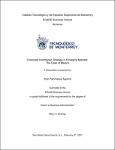Mostrar el registro sencillo del ítem
Corporate Nonmarket Strategy in Emerging Markets: The Case of Mexico
| dc.contributor.advisor | Husted Corregan, Bryan William | |
| dc.contributor.author | Palomares Aguirre, Itzel | |
| dc.date.accessioned | 2021-09-03T16:42:48Z | |
| dc.date.available | 2021-09-03T16:42:48Z | |
| dc.date.issued | 2021-02-05 | |
| dc.identifier.citation | Palomares Aguirre, I. (2021). Corporate Nonmarket Strategy in Emerging Markets: The Case of Mexico. (Tesis doctoral). Instituto Tecnológico y de Estudios Superiores de Monterrey. Disponible en https://hdl.handle.net/11285/638124 | es_MX |
| dc.identifier.uri | https://hdl.handle.net/11285/638124 | |
| dc.description | 0000-0002-5978-7413 | es_MX |
| dc.description.abstract | Nonmarket strategy has always been an integral part of the firm’s strategy. However, as scholars have studied nonmarket strategy, they have acknowledged its increasing relevance as part of the firm’s strategy. Managers have become more interested in complementing the traditional market strategies focused on how to improve firm performance with either corporate social responsibility (CSR) initiatives or corporate political activity (CPA) actions. Even the government and the general public pay more attention to the firm’s nonmarket actions. For business, the use of CSR and CPA seeks to reduce uncertainty by creating social and political goodwill. However, most of what we have learned about nonmarket strategy in general is based on studies carried out in developed economies, which have strong institutions that provide a system of checks and balances and a set of guidelines. I contend that emerging markets such as Mexico have different “rules of the game” and thus nonmarket strategy will have different results when implemented in firms operating in such emerging contexts. The present dissertation aims to explain how firms in emerging markets use corporate nonmarket strategy to obtain a strategic advantage. Specifically, three studies have been conducted to understand the use of nonmarket strategy in an emerging economy such as Mexico. The first paper aims to look at the influence of country level characteristics on the likelihood of engaging in earnings management. Results show that emerging economies differ from developing economies in the effect of board characteristics CEO duality and board independence on the likelihood of earnings management, requiring that current theories adapt to the reality of these differences between both sets of countries. The second paper looks at the inner circle of firms listed in the Mexican Stock Exchange. This is a descriptive study that maps fifteen years of board members and their relationships, concluding that the disappearance of the inner circle that has been documented on other developed economies is not happening in Mexico. Finally, the third paper uses a foreground/background metaphor to explore how influence payments can be performed in the foreground (e.g. political donations) or in the background (e.g. questionable payments) and the effect of such in financial performance. We found a mediation mechanism between political donation and firm performance consisting of the firm’s power in the network of board interlocks. Together these three studies show both the complexity and importance of nonmarket strategy for securing a competitive advantage. However, results also show that strategies regarding board composition and its monitoring functions that are successful in developed economies might not translate with the same effect in emerging markets. Thus, the importance of conducting research in emerging contexts for testing our knowledge on nonmarket strategy. Results of the studies make contributions to the field of strategic management. | es_MX |
| dc.format.medium | Texto | es_MX |
| dc.language.iso | eng | es_MX |
| dc.publisher | Instituto Tecnológico y de Estudios Superiores de Monterrey | es_MX |
| dc.relation.isFormatOf | versión publicada | es_MX |
| dc.rights | openAccess | es_MX |
| dc.rights.uri | http://creativecommons.org/licenses/by-nc-nd/4.0 | es_MX |
| dc.subject.classification | CIENCIAS SOCIALES::CIENCIAS ECONÓMICAS::ECONOMÍA INTERNACIONAL::POLÍTICA ECONÓMICA INTERNACIONAL | es_MX |
| dc.subject.lcsh | Social Sciences | es_MX |
| dc.title | Corporate Nonmarket Strategy in Emerging Markets: The Case of Mexico | es_MX |
| dc.type | Tesis Doctorado / doctoral Thesis | es_MX |
| dc.contributor.department | EGADE Business School | es_MX |
| dc.contributor.committeemember | Rocha González, Jorge Miguel | |
| dc.contributor.committeemember | Briseño García, Arturo | |
| dc.identifier.orcid | 0000-0002-9479-2138 | es_MX |
| dc.subject.keyword | nonmarket strategy | es_MX |
| dc.subject.keyword | corporate political activity | es_MX |
| dc.subject.keyword | political contributions | es_MX |
| dc.subject.keyword | board of directors | es_MX |
| dc.contributor.institution | Campus Monterrey | es_MX |
| dc.contributor.cataloger | tolmquevedo | es_MX |
| dc.description.degree | Doctora en Ciencias Administrativas | es_MX |
| dc.identifier.cvu | 319357 | es_MX |
| dc.date.accepted | 2021-02-05 | |
| dc.audience.educationlevel | Investigadores/Researchers | es_MX |
| dc.identifier.scopusid | 57200037446 | es_MX |
| dc.identificator | 5||53||5310||531005 | es_MX |
Ficheros en el ítem
Este ítem aparece en la(s) siguiente(s) colección(ones)
-
Ciencias Sociales 565
Gobierno y Transformación Pública / Humanidades y Educación / Negocios / Arquitectura y Diseño / EGADE Business School



